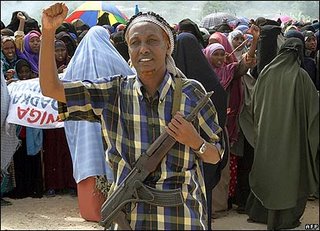Somalia once again finds itself in the global spotlight—for more conflict. Since the fall of Siyad Barre sixteen years ago, the country has seen over a dozen peace conferences and numerous pseudo-governments—all of which have failed. The most recent of these so-called peace conferences took place in Kenya and lasted almost three years. The outcome was a Transitional Government (TNG) comprised mainly of warlords, tribal chiefs—or both in some cases—and a few representatives from civil society. A new constitution and parliament were also established, with each tribe allocated a specific number of seats, including in the government.
Despite these efforts, Mogadishu, the capital city, remained under the control of warlords—many of whom held ministerial positions in the TNG. They were expected to welcome the government and hand over their weapons. But things didn’t go as planned. Disputes between the government, parliament, and warlords began even before they left Kenya, where the conference was held. The weak government set up base in Baidao, while the warlords returned to their "business" of warlordship, openly challenging and criticizing the government. Government officials became divided between Baidao and Mogadishu. Once again, the hopes of the Somali people for a functioning government were dashed.
To make matters worse, a US-backed coalition of warlords calling themselves the Anti-Terror Coalition was formed, supposedly to fight terrorism. The residents of Mogadishu faced emboldened warlords and yet another conflict.
The Rise of the Islamic Courts
Islamic courts began to emerge in the 1990s across southern Somalia as a response to rampant crime. At the time, Mogadishu was utterly lawless, with criminals and militia operating checkpoints on nearly every street. No one was safe in the city. The Islamic courts provided a much-needed solution to this chaos. Small courts were established in various districts to impose some rule of law, and they quickly gained grassroots support. Funded by local businessmen, the courts dramatically improved safety in the areas under their control.
Initially, the courts operated independently, with no unified front or political agenda. Over time, however, they united under the banner of the United Islamic Courts (UIC) and, with the backing of powerful militias supported by Mogadishu's businessmen, became a formidable force.

Warlords Flee, Mogadishu is Safe Again
As the power of the UIC grew, warlords—and the US—became increasingly anxious. The warlords persuaded the US to support their efforts to oust the Islamic militia. However, when the two militias clashed, the warlords who had controlled Mogadishu for sixteen years were swiftly defeated and forced to flee the city. The people of Mogadishu celebrated in the streets as though they had been liberated.
Once again, the UIC delivered on its promises. Even the UN envoy to Somalia acknowledged their achievements, saying, "I take note that [the UIC] has achieved great things in Mogadishu. I have seen it."
US, Ethiopia, The Government, and the UIC: The Conflict Continues
One might have expected the government to welcome this development and initiate negotiations with the UIC. Instead, they declared hostility toward the group and withdrew from ongoing negotiations in Sudan. The Ethiopian government, fearful of the UIC's influence, threw its support behind the Somali government.
What is ahead for Somalia?The government remains weak, the UIC is under pressure but advancing, and Ethiopian troops have occupied a few cities in the west. The government accuses the UIC of harboring terrorists and foreign fighters within its ranks, while the UIC counters by accusing the government of being agents of Ethiopia.
Perhaps we will see yet another peace conference in a few years' time.
Filed Under: Somalia, Africa, War
No comments:
Post a Comment